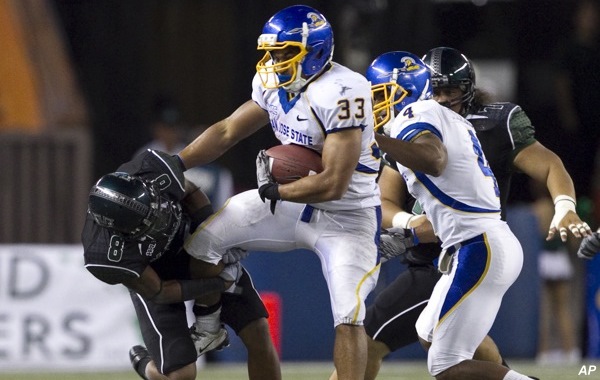During the past year, the WAC has seen all of its best football teams leave for the Mountain West and the conference has had little retaliation.
Tuesday's vote of the board of directors was supposed to usher in the new WAC, but instead, the conference decided against adding football schools -- it did add basketball-only member Seattle -- and play with seven football schools in 2012.
Commissioner Karl Benson said the league had been in touch with 10 to 12 football playing schools, including schools from the FCS, but that the economy halted some of those schools from making the jump to the FBS.
"We will continue to look at both FCS and FBS schools and could have another member by this time next year, or possibly sooner," Benson said during a conference call Tuesday.
"We hope in the next year that the timing will be better. Hopefully a year from now there may be football playing schools ready to make a move to the WAC."
By the end of the 2011 season, the WAC will have lost Boise State, Fresno State, Nevada and Hawaii, the four teams that essentially made the WAC a viable FBS league. Since 2007, those four teams have been to a total of 15 bowl games, including a BCS bowl by Boise State. The only team out of that group not to make the postseason every year since 2007 is Hawaii, which didn't play in a bowl in 2009.
The WAC's remaining five teams -- Utah State, San Jose State, Louisiana Tech, Idaho and New Mexico State -- have played in a total of two bowl games thanks to Louisiana Tech and Idaho. San Jose State last played in a bowl in 2006, Utah State in 1997 and New Mexico State? Well, the Aggies haven't played in a bowl since 1960.
That's why it's difficult to see this league being able to sustain itself without some new blood or an old member making a radical transformation. The WAC does add Texas State and Texas-San Antonio as football members in 2012, but it will take some time for both schools to get used to the level of competition.
Still, Benson knows for his league to continue, he needs one of the seven football schools to fill the voids left by the departed.
"It will be important this year for the five remaining WAC schools to show some success," Benson said. "It will be important for one of those five teams to contend for a WAC championship, to go to a bowl game, to carry the WAC umbrella into the postseason. I've been asked many times what the future holds and I think I've been consistent in saying there isn't any reason one of those schools or perhaps a Texas State or UT-San Antonio can't be the next Boise State.
"Ten years ago when Boise State joined the WAC, I don't think anybody expected Boise State to have the dominance it has had. Looking at the five remaining members of the WAC, I don't see a whole lot of difference between those five programs in 2011 than where Boise State was in 2001. It's very realistic that one of those five schools can indeed be the flag bearer and a national power coming out of the WAC."
In addition to losing membership, the WAC also loses tow bowl tie-in. The WAC will have three bowls for the 2011 season, but then drop to just one in 2012 -- the WAC champ will head to the Humanitarian Bowl. The WAC will be the only conference with one bowl tie-in.
It's hard to predict what the future holds for the WAC. There are some stellar FCS schools out there including Montana, Eastern Washington and North Dakota State, that all fit into the WAC footprint, but being financially stable enough to make the move to the FBS is the biggest challenge. Montana has done at least two feasibility studies and determined that it didn't have the finds to make the jump. Meanwhile, pickings are slim in the FBS. North Texas has already resisted an overture from the WAC and the other schools in the Sun Belt provide little television market help.
The WAC has a year or so to figure out its next move or it might have a hard time keeping pace, and even existing, with the rest of he FBS.
|
|
|
Results 1 to 1 of 1
-
06-15-2011, 05:56 AM #1Administrator



- Join Date
- Jun 2007
- Location
- Canada
- Age
- 49
- Posts
- 60,955
- Blog Entries
- 3
- Downloads
- 9
- Uploads
- 12429
 WAC doesn’t add to football membership, hopes remaining members emerge
WAC doesn’t add to football membership, hopes remaining members emerge
Similar Threads
-
Ole Miss’ star recruit ‘voluntarily’ abandons Twitter after controversial tweet’
By admin in forum Sports NewsReplies: 0Last Post: 06-28-2011, 05:46 AM -
Days of NBA Lives: Wherein Jason Richardson doesn’t like advanced stats
By admin in forum Sports NewsReplies: 0Last Post: 06-28-2011, 05:46 AM -
It doesn’t sound like Portland will be drafting Isaiah Thomas
By admin in forum Sports NewsReplies: 0Last Post: 06-23-2011, 11:57 AM -
Chandella video: ‘Hey’ and ‘Shorty’ won’t lead to landing an Octagon girl
By admin in forum Sports NewsReplies: 0Last Post: 05-31-2011, 05:45 AM -
Derrick Rose and the NBA’s apparent ‘huge’ steroid problem
By admin in forum Sports NewsReplies: 0Last Post: 05-22-2011, 06:35 PM






 Reply With Quote
Reply With Quote

Bookmarks